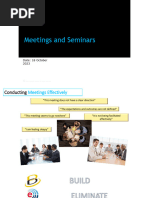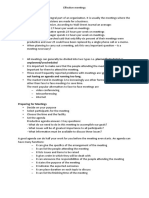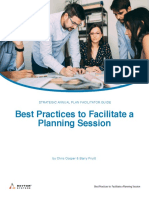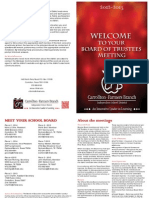0 ratings0% found this document useful (0 votes)
87 viewsUnit 16 - Business Meetings
Unit 16 - Business Meetings
Uploaded by
Miguel Angel Escoto CanoGuy Brook-Hart, Norman Whitby and Cambridge ESOL. Business Benchmark Upper Intermediate. Cambridge University Press, 2007.
Reading: Think before you meet.
Listening: Talking about meetings. A business meeting.
Writing: A report about meetings. An email agreeing to a meeting.
Speaking: Discussion: meetings. A survey of meetings; Speaking at a meeting.
Vocabulary: Types of meeting; Meeting vocabulary, verbs for meetings; cornerstone, set out to, etc.; Expressing opinions
Copyright:
© All Rights Reserved
Available Formats
Download as PPT, PDF, TXT or read online from Scribd
Unit 16 - Business Meetings
Unit 16 - Business Meetings
Uploaded by
Miguel Angel Escoto Cano0 ratings0% found this document useful (0 votes)
87 views19 pagesGuy Brook-Hart, Norman Whitby and Cambridge ESOL. Business Benchmark Upper Intermediate. Cambridge University Press, 2007.
Reading: Think before you meet.
Listening: Talking about meetings. A business meeting.
Writing: A report about meetings. An email agreeing to a meeting.
Speaking: Discussion: meetings. A survey of meetings; Speaking at a meeting.
Vocabulary: Types of meeting; Meeting vocabulary, verbs for meetings; cornerstone, set out to, etc.; Expressing opinions
Original Title
Unit 16 - Business meetings
Copyright
© © All Rights Reserved
Available Formats
PPT, PDF, TXT or read online from Scribd
Share this document
Did you find this document useful?
Is this content inappropriate?
Guy Brook-Hart, Norman Whitby and Cambridge ESOL. Business Benchmark Upper Intermediate. Cambridge University Press, 2007.
Reading: Think before you meet.
Listening: Talking about meetings. A business meeting.
Writing: A report about meetings. An email agreeing to a meeting.
Speaking: Discussion: meetings. A survey of meetings; Speaking at a meeting.
Vocabulary: Types of meeting; Meeting vocabulary, verbs for meetings; cornerstone, set out to, etc.; Expressing opinions
Copyright:
© All Rights Reserved
Available Formats
Download as PPT, PDF, TXT or read online from Scribd
Download as ppt, pdf, or txt
0 ratings0% found this document useful (0 votes)
87 views19 pagesUnit 16 - Business Meetings
Unit 16 - Business Meetings
Uploaded by
Miguel Angel Escoto CanoGuy Brook-Hart, Norman Whitby and Cambridge ESOL. Business Benchmark Upper Intermediate. Cambridge University Press, 2007.
Reading: Think before you meet.
Listening: Talking about meetings. A business meeting.
Writing: A report about meetings. An email agreeing to a meeting.
Speaking: Discussion: meetings. A survey of meetings; Speaking at a meeting.
Vocabulary: Types of meeting; Meeting vocabulary, verbs for meetings; cornerstone, set out to, etc.; Expressing opinions
Copyright:
© All Rights Reserved
Available Formats
Download as PPT, PDF, TXT or read online from Scribd
Download as ppt, pdf, or txt
You are on page 1of 19
BUSINESS ENGLISH II
Unit 16: Business Meetings
Free Powerpoint Templates
Page 1
Free Powerpoint Templates
Page 2
70 of 160 hours per month are
consumed by business meetings
(1 day= 8 hours; 1 week= 40 hours; 1 month= 160 hours)
Free Powerpoint Templates
Page 3
“There is a lot of discussion, few concrete
results emerge”
Usually the most enjoyable meetings are also
the ones that are the most efficient and
Free Powerpoint Templates
productive.
Page 4
List some characteristics…
Time-wasting meetings Meetings that really work
Free Powerpoint Templates
Page 5
Characteristics of Time Wasters
• There is no agenda.
• The agenda is not followed.
• Material for the meeting is not given out
ahead of time.
• Little gets accomplished.
• More than one person talks at once.
• Some participants dominate the discussion.
• The meeting goes longer than scheduled.
• Not everyone participates.
Free Powerpoint Templates
Page 6
If you want to get meetings
that really work
Try using this check list as a stepping off point:
• Leadership
• Participants (not just attendants)
• Purpose
• Agenda
• Minutes
• Background
• Meeting time and place
Free Powerpoint Templates
Page 7
Leadership
The chairperson is in a prime position to change the
direction of any meeting. It is the chairperson’s
role to:
• make sure the business is carried out on time.
• keep the discussion on topic .
• make sure all members understand the purpose of the
board meetings and the reason for agenda items.
• insist that all reports are sent out ahead of time and
are read before the meeting.
Free Powerpoint Templates
Page 8
Free Powerpoint Templates
Page 9
Participants
• Board members have a responsibility to block time
to attend board meetings.
• They know their role in helping the meeting to
reach its objectives.
• They do their homework so they can participate
fully.
• They take notes so that they can be aware of the
issues as well as remember what they agreed
needed to be done.
Free Powerpoint Templates
Page 10
Free Powerpoint Templates
Page 11
Purpose
Before any and all meetings, board members
should be able to answer the questions,
“What are we going to resolve or
accomplish?”
Three kinds of reports are processed at a
board meeting: for information; for
discussion; or for decision and action.
Free Powerpoint Templates
Page 12
Agenda
Poor meetings can result from poor agendas.
AN EXAMPLE OF AN ILLUSTRATIVE AGENDA
Meeting: _____________________________________________________________
Date: ________________________________________________________________
Time: ________________________________________________________________
Place: _______________________________________________________________
Timing Details Action Who is Resource Outcome/ Follow-up
Agenda Required Responsible Materials What Action
Items (Decision,* e.g. Happened Who/
Discussion, Reports, ? When?
Information) Budget
Free Powerpoint Templates
Page 13
Minutes
Minutes of the meeting should be available as
soon as possible after the meeting. The
purpose of the minutes is to:
• provide a permanent record of a meeting;
• keep track of progress;
• inform absent members;
• help in the orientation of new members;
• provide a useful guide for evaluating.
Free Powerpoint Templates
Page 14
Background
The primary purpose of board meetings is to
make decisions concerning the future
direction of the organization. Be prepared
to attend a meeting with the materials
read, your report ready, and a draft
motion if you intend to make a motion.
Free Powerpoint Templates
Page 15
Meeting Time and Place
Each board member is responsible for
knowing the date, time and location of the
meeting.
If you are having attendance problems at
meetings, have members call and remind
other members several days prior to the
meeting.
Free Powerpoint Templates
Page 16
Meeting Tips
• Do start the meeting on time. Reward
punctuality.
• Avoid automatically covering ‘old business’ at
every meeting.
• Do make the meeting fun and informative as
well as productive.
• Put important issues needing debate early in
the agenda. This allows people to respond
when they are still fresh.
Free Powerpoint Templates
Page 17
Meeting Tips
• Enforce attendance. Absentee members, do
not help get the board’s work done.
• Set a time limit for board meetings and stick
to it.
• Do have a brief verbal summary at the end of
the meeting outlining what was accomplished
Free Powerpoint Templates
Page 18
Free Powerpoint Templates
Page 19
You might also like
- Meetings Bloody MeetingsDocument4 pagesMeetings Bloody MeetingsMostafa MekawyNo ratings yet
- Democratic Network Political Action Committee (PAC) Bylaws - DraftDocument43 pagesDemocratic Network Political Action Committee (PAC) Bylaws - DraftDemocraticNetworkNo ratings yet
- Commission ReformDocument9 pagesCommission ReformGtownVoiceNo ratings yet
- Leading Effective MeetingDocument33 pagesLeading Effective MeetingLenaldy Nuari GarnokoNo ratings yet
- Unit 14 - Business ConferencesDocument10 pagesUnit 14 - Business ConferencesMiguel Angel Escoto CanoNo ratings yet
- Managing Meetings: Presented To: Dr. Ijaz Ahmad TatlahDocument20 pagesManaging Meetings: Presented To: Dr. Ijaz Ahmad TatlahMuhammad JavedNo ratings yet
- Essential Meeting Skills - Chair & Minute TakingDocument24 pagesEssential Meeting Skills - Chair & Minute TakingAmir IejieNo ratings yet
- Managing Meetings Quick ReferenceDocument3 pagesManaging Meetings Quick ReferencesbahourNo ratings yet
- What Are Meeting FinalDocument4 pagesWhat Are Meeting Finalsanaullah-khan-9100No ratings yet
- How To Create An Agenda STP by StepDocument39 pagesHow To Create An Agenda STP by StepAnkit SrivastavaNo ratings yet
- Meeting NotesDocument8 pagesMeeting NotesAnderson M MiritiNo ratings yet
- Business Meeting Slide ShowDocument23 pagesBusiness Meeting Slide ShowKasiraman RamanujamNo ratings yet
- MeetDocument6 pagesMeetodufghodNo ratings yet
- BC Unit 5Document25 pagesBC Unit 5Ankit ChourasiaNo ratings yet
- Assignment 1-Conducting Meetings, Roll No. FA20-BEE-146, Souban JavaidDocument57 pagesAssignment 1-Conducting Meetings, Roll No. FA20-BEE-146, Souban JavaidSouban JavedNo ratings yet
- Reading Day MaterialDocument30 pagesReading Day Materialxuv700awdNo ratings yet
- Module Ten WorksheetDocument4 pagesModule Ten WorksheetGaurav BishtNo ratings yet
- Effect Meet PDFDocument6 pagesEffect Meet PDFraNo ratings yet
- Meetings, CC and SeminarsDocument59 pagesMeetings, CC and Seminarsusless018No ratings yet
- Achieving Business Results Through Effective MeetingsDocument20 pagesAchieving Business Results Through Effective Meetingsapi-3740348No ratings yet
- MeetingDocument41 pagesMeetingmenakshresthaNo ratings yet
- Meeting N Conferences-JyotiDocument36 pagesMeeting N Conferences-Jyotiambikaantil4408No ratings yet
- Minute Taking Tips - Karen MaherDocument36 pagesMinute Taking Tips - Karen MaherLevyNo ratings yet
- Effective Meetings Toolkit: Version 1.0 October 2020Document30 pagesEffective Meetings Toolkit: Version 1.0 October 2020Wong Chee LoongNo ratings yet
- Minutes of MeetingDocument4 pagesMinutes of MeetingManinder KaurNo ratings yet
- Activities Module 7zDocument7 pagesActivities Module 7zM Prithivi RajNo ratings yet
- Meeting MinutesDocument7 pagesMeeting MinutesUsama AzizNo ratings yet
- Business MeetingsDocument25 pagesBusiness MeetingsAndriana HamivkaNo ratings yet
- Effective MeetingsDocument3 pagesEffective MeetingsMohammad MoosaNo ratings yet
- Unit II: Meeting and Boardroom Protocol: Guidelines For Planning A MeetingDocument35 pagesUnit II: Meeting and Boardroom Protocol: Guidelines For Planning A MeetingHema vijay sNo ratings yet
- Meetings Meetings: Nasir AliDocument37 pagesMeetings Meetings: Nasir AliBenudeep Chandra Mouli ReddyNo ratings yet
- Formal Meeting and MinutesDocument17 pagesFormal Meeting and MinutesRehan Khan RkNo ratings yet
- Presentation MeetingDocument19 pagesPresentation MeetingAnees Ur RehmanNo ratings yet
- Conducting Meetings RAP SessionsDocument12 pagesConducting Meetings RAP SessionsjsNo ratings yet
- Bussiness Com ExerciseDocument7 pagesBussiness Com ExerciseRuthira Nair AB KrishenanNo ratings yet
- Secrets To Running ProjectDocument17 pagesSecrets To Running ProjectIkechukwu Stanley OkoroNo ratings yet
- Meeting PDFDocument12 pagesMeeting PDFnurul syakilla nabilaNo ratings yet
- Presentation On Busniess Meeting Minutes and Agenda: Presented byDocument19 pagesPresentation On Busniess Meeting Minutes and Agenda: Presented byRaman KulkarniNo ratings yet
- Conducting MeetingsDocument21 pagesConducting MeetingsFaithNo ratings yet
- MeetingDocument15 pagesMeetingNilesh D PatilNo ratings yet
- Guidelines For Promoting Effective Staff Meetings: Wellness at Work Partnership Group (Cork/Kerry)Document14 pagesGuidelines For Promoting Effective Staff Meetings: Wellness at Work Partnership Group (Cork/Kerry)PeepsNo ratings yet
- Facilitator Guide - Best PracticesDocument13 pagesFacilitator Guide - Best PracticesMariaNo ratings yet
- Comm Notes - 32 - Meeting MembersDocument9 pagesComm Notes - 32 - Meeting MembersAndrew kashobondoNo ratings yet
- Meeting Culture Best Practice GuideDocument11 pagesMeeting Culture Best Practice Guideamitsingh1811No ratings yet
- Preparation and Attendance and Setting Out A Meeting Agenda and Minutes of A MeetingDocument9 pagesPreparation and Attendance and Setting Out A Meeting Agenda and Minutes of A MeetingWali HaiderNo ratings yet
- Basic Guide To Conducting Effective MeetingsDocument12 pagesBasic Guide To Conducting Effective MeetingsPokli PuskersinNo ratings yet
- Effective Minute-Taking: Tips to Improve Your Meeting-Recording SkillsFrom EverandEffective Minute-Taking: Tips to Improve Your Meeting-Recording SkillsRating: 4.5 out of 5 stars4.5/5 (4)
- Secretary - Unit 6Document37 pagesSecretary - Unit 6samah ismailNo ratings yet
- SHO Professional English - Minute TakingDocument20 pagesSHO Professional English - Minute TakingIsmail JunaidiNo ratings yet
- Managing Meetings Quick ReferenceDocument2 pagesManaging Meetings Quick ReferenceStephanieD.MauroNo ratings yet
- Class Reps: Minute-TakingDocument20 pagesClass Reps: Minute-TakingAmrit NeupaneNo ratings yet
- 010 ANEXO - Progress-Plans-Problems-Facilitators-GuideDocument10 pages010 ANEXO - Progress-Plans-Problems-Facilitators-Guidejoseluis.casadolozano9682No ratings yet
- MeetingsDocument7 pagesMeetingsThendral ManikantanNo ratings yet
- Agenda and Minutes of The MeetingDocument25 pagesAgenda and Minutes of The MeetingSub Kuch MilegaNo ratings yet
- Planning For, & Participating in Meetings: Unit 4Document57 pagesPlanning For, & Participating in Meetings: Unit 4Neggaz D MapeleNo ratings yet
- AgendaDocument6 pagesAgendaVanshika KalraNo ratings yet
- Effective - Meetings Manitoba GuidebookDocument23 pagesEffective - Meetings Manitoba GuidebookRubí VelázquezNo ratings yet
- Dental Offices ManagementDocument72 pagesDental Offices ManagementPRATIK SHRESTHANo ratings yet
- 6 Steps For A Successful Project Post Mortem MeetingDocument10 pages6 Steps For A Successful Project Post Mortem MeetingMohamad Zaki AhmadNo ratings yet
- Chairing A MeetingDocument15 pagesChairing A MeetingProspect Motsi100% (1)
- Working in Groups:: 5 EditionDocument27 pagesWorking in Groups:: 5 EditiontizazuNo ratings yet
- 10 Meeting Rules To Host Productive and Effective MeetingsDocument16 pages10 Meeting Rules To Host Productive and Effective MeetingsJUNAYED AHMED RAFINNo ratings yet
- Business English Ii: Corresponding With CustomersDocument24 pagesBusiness English Ii: Corresponding With CustomersMiguel Angel Escoto CanoNo ratings yet
- Unit 7 Management StylesDocument25 pagesUnit 7 Management StylesMiguel Angel Escoto CanoNo ratings yet
- Unit 22 - Communication With CustomersDocument20 pagesUnit 22 - Communication With CustomersMiguel Angel Escoto CanoNo ratings yet
- Unit 20 - Offshoring and OutsourcingDocument21 pagesUnit 20 - Offshoring and OutsourcingMiguel Angel Escoto CanoNo ratings yet
- Business English Ii: New Technologies and ChangeDocument24 pagesBusiness English Ii: New Technologies and ChangeMiguel Angel Escoto CanoNo ratings yet
- Unit 15 - Business ReportsDocument22 pagesUnit 15 - Business ReportsMiguel Angel Escoto CanoNo ratings yet
- Unit 13 - Business Hotels and Sales ConferencesDocument24 pagesUnit 13 - Business Hotels and Sales ConferencesMiguel Angel Escoto CanoNo ratings yet
- Sample Minutes of English Language Panel MeetingDocument5 pagesSample Minutes of English Language Panel MeetingCherilyn Woan WoanNo ratings yet
- Hrpta MinutesDocument2 pagesHrpta MinutesMayumi Joweeanne MapueNo ratings yet
- 2020-Procedural Handbook-ApanpirgDocument87 pages2020-Procedural Handbook-ApanpirgMichael Andreas PurwoadiNo ratings yet
- Ozhouse Clean - PolicyDocument2 pagesOzhouse Clean - Policyanish100% (2)
- Meetings: Types, Purpose, Advantages and Disadvantages!: Solve Problems, EtcDocument17 pagesMeetings: Types, Purpose, Advantages and Disadvantages!: Solve Problems, EtcArjun SukumaranNo ratings yet
- Minutes of The MeetingDocument24 pagesMinutes of The Meetingcherrypenida5No ratings yet
- Minutes of MeetingDocument4 pagesMinutes of MeetingMuhammad Abdullah 938-FET/BSME/F20No ratings yet
- Meeting AgendaDocument4 pagesMeeting AgendaCaustic ToxicNo ratings yet
- Example Configuration Control Board CharterDocument4 pagesExample Configuration Control Board CharterpriteshjNo ratings yet
- Douglas County School District Board of Trustees Agenda: Sept. 9Document9 pagesDouglas County School District Board of Trustees Agenda: Sept. 9cvalleytimesNo ratings yet
- Examples of Meeting MinutesDocument64 pagesExamples of Meeting MinutesRhea Mae AmitNo ratings yet
- Sample Meeting AgendaDocument1 pageSample Meeting AgendaghmeenaNo ratings yet
- Constitution of Furum of MenDocument9 pagesConstitution of Furum of MenUkeje ChikaNo ratings yet
- Procedure of A Board MeetingDocument2 pagesProcedure of A Board MeetingAkshayaNo ratings yet
- Language of MeetingsDocument3 pagesLanguage of MeetingsGeooTyNo ratings yet
- Board of Trustees Meeting BrochureDocument2 pagesBoard of Trustees Meeting BrochureCFBISDNo ratings yet
- ILO ConstitutionDocument30 pagesILO ConstitutionMajid KianiNo ratings yet
- Business English Introduction To MeetingsDocument12 pagesBusiness English Introduction To MeetingsHerman Abdullah100% (1)
- Mitchell Board of Education June 26 Meeting AgendaDocument33 pagesMitchell Board of Education June 26 Meeting AgendainforumdocsNo ratings yet
- Guided Writing Focused On Conducting A MeetingDocument18 pagesGuided Writing Focused On Conducting A Meetingkrishnamaecortega09No ratings yet
- Duties of The Discussion Leader and Participant: Lesson 4Document16 pagesDuties of The Discussion Leader and Participant: Lesson 4Marjorie GalangkeNo ratings yet
- FAI Club Management Guide 3rd EditionDocument128 pagesFAI Club Management Guide 3rd EditionBrianNo ratings yet
- Mitchell Board of Education Agenda - 010923Document18 pagesMitchell Board of Education Agenda - 010923inforumdocsNo ratings yet
- BSBTWK503 PPT v1.0Document103 pagesBSBTWK503 PPT v1.0Gabriel ZuanettiNo ratings yet
- Metro Board of Directors Agenda June 2020Document20 pagesMetro Board of Directors Agenda June 2020Metro Los AngelesNo ratings yet
- English For Business: Useful Phrases To Use During A Business MeetingDocument3 pagesEnglish For Business: Useful Phrases To Use During A Business MeetingNune GrigoryanNo ratings yet
- Municipality of Talayan Office of The Sangguniang BayanDocument15 pagesMunicipality of Talayan Office of The Sangguniang BayanJomidy MidtanggalNo ratings yet































































































